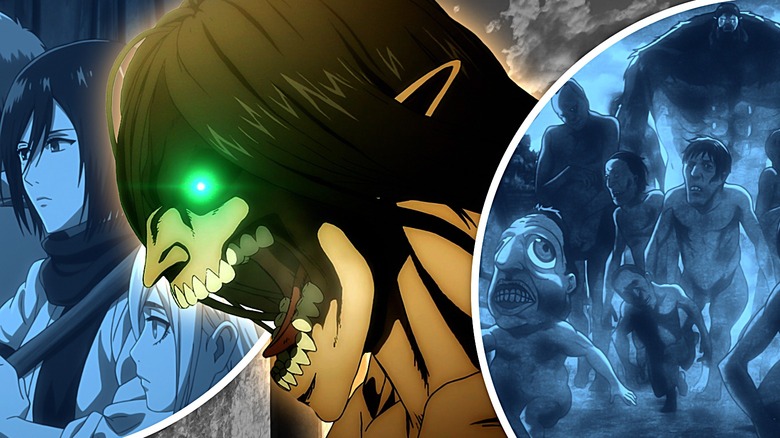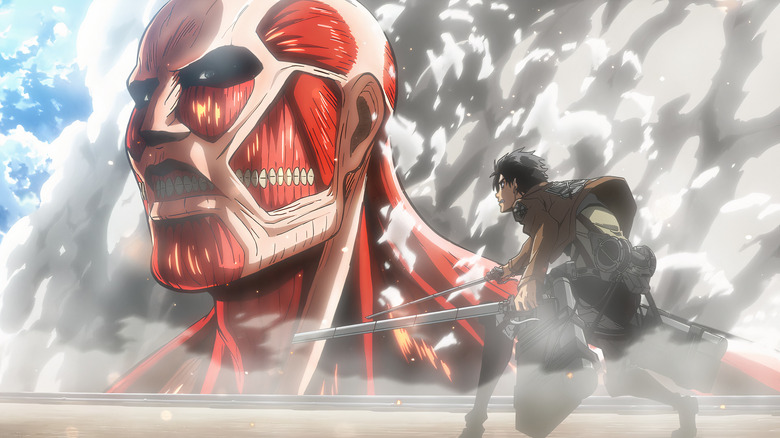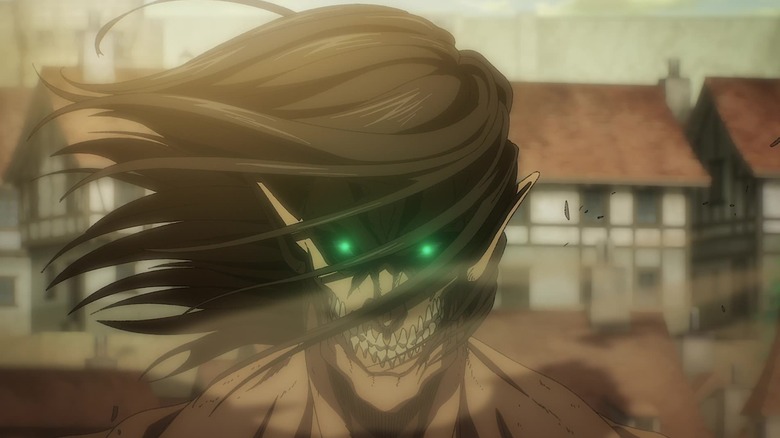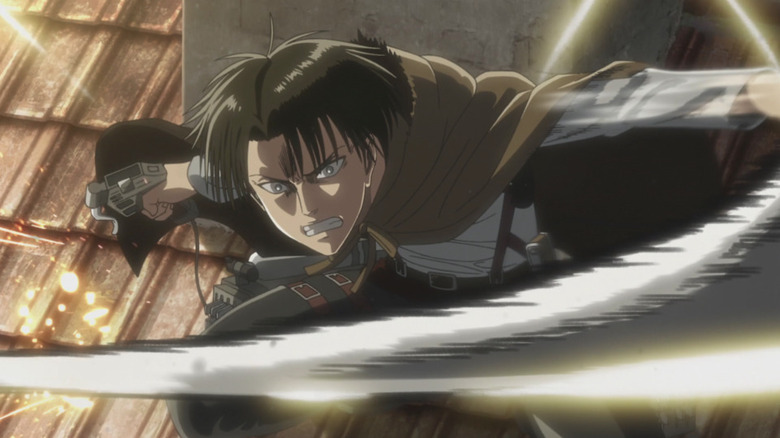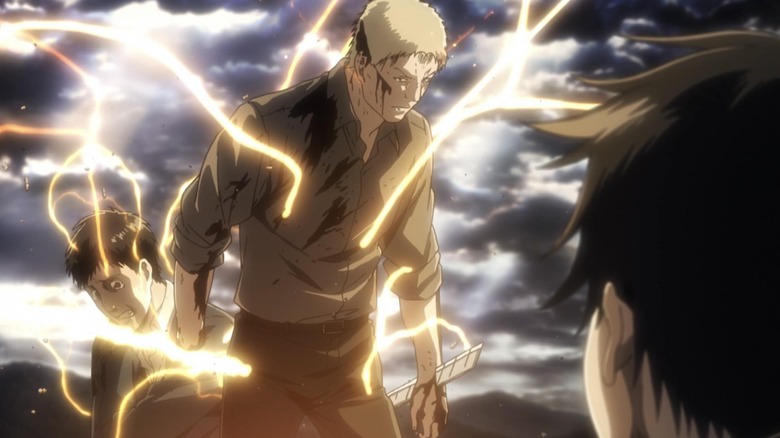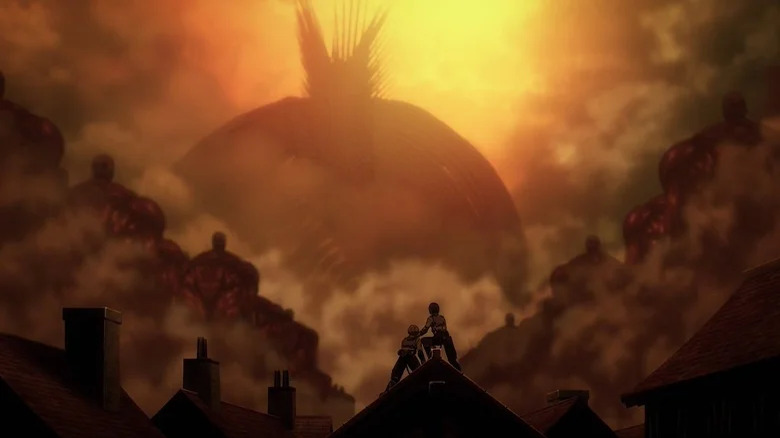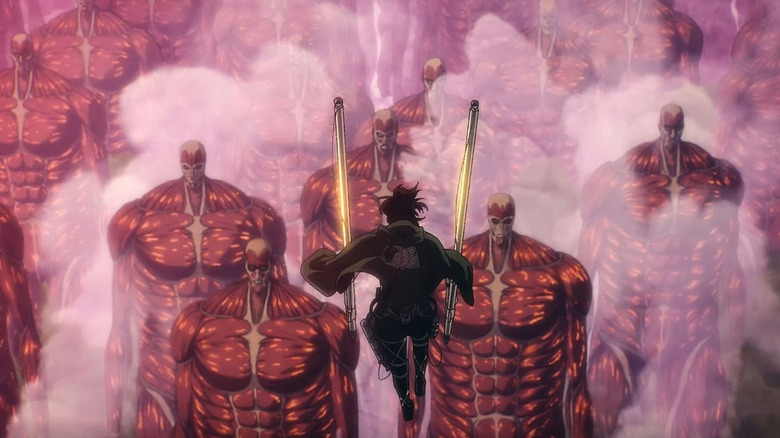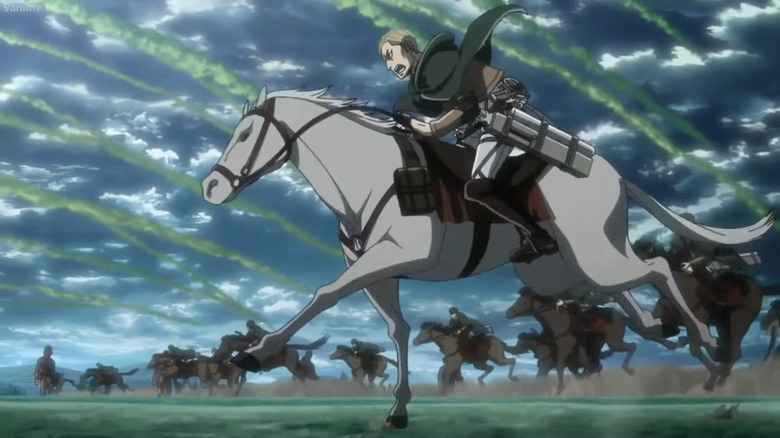Every Season Of Attack On Titan, Ranked Worst To Best
"Attack on Titan" is the defining anime of the 2010s, the show that paved the way for a trend of manga getting blockbuster anime adaptations, a show that paved the way for anime to be not just mainstream, but openly talked about in the same vein as prestige TV. Based on the manga of the same name by Hajime Isayama, the story follows Eren Yaeger and his friends as they fight against terrifying titans that plague walled-in cities, as they discover the mysteries of the world. The show quickly captivated audiences worldwide and had them obsessing over the bleak story, gruesome action, thrills, plot twists, and the many, many upsetting deaths that proved no character was safe.
With the show now concluded after a decade on the air, it's time to ranked every season of "Attack on Titan." It should be noted that the seasons of this anime were structured slightly differently than some other anime, at least when it came to the naming convention of the seasons. Unlike, say, "Demon Slayer," which simply names each season according to which story arc it's adapting, "Attack on Titan" named its seasons after numbers, only to then split them off according to story arcs, releasing split seasons over two or even three years in several small chunks. Because of this, this list will split each season in the way it was released, with the last two special chapters being considered to be one single "season" as they are clearly the same story arc just split down the middle. Without further ado, here is every season of "Attack on Titan," ranked.
7. Season 1
There's a reason "Attack on Titan" quickly got catapulted to being the biggest anime around when it first debuted. The first episode alone is a masterclass in introducing a new world and in hooking an audience into a story. Like the first season of "Game of Thrones," it serves to create a thrilling narrative with a compelling mystery, likable characters, and a bleak-as-hell tone that killed off main characters left and right. Whether you wanted a new anime that felt new and exciting, or you had never once dipped your toes in the medium, it was this first season that made the show into the perfect anime for newcomers.
Looking back at the first season of "Attack on Titan" now that the entire story is out, it is striking how colorful the early seasons were, and how WIT Studio reinterpreted the characters and the manga and created an extremely violent, gnarly show that nevertheless looked enticingly vibrant and full of life. Still, as much as the first season introduced a world, a cast of characters, and had some great reveals and memorable action scenes, it is still very much the start of the story, so it's hard to rank it higher than later seasons.
6. Season 4: Part 1
The biggest magic trick "Attack on Titan" ever pulled was becoming a radically different show in its fourth and final season. Other shows, like "Vinland Saga," have changed tones in their second seasons, but "Attack on Titan" felt like something completely new. After unveiling the truth of the show's world, we get an entirely new cast, new setting, new tone, and new art and animation style to boot.
Most importantly, the show shifts its point of view, and forces the audience to follow what they considered to be the antagonists' side without any familiar face in sight for weeks at a time (other than characters that audiences were trained to hate more than anything just a season prior). This reshaped the core message of "Attack on Titan" as it forced the audience to reconsider who the villains are as the show changed from what we thought was a post-apocalyptic world to a war drama and the themes became much more human as racism, xenophobia, bigotry, and propaganda became the real monsters rather than giant mutants.
Season 4: Part 1 also sees Eren start his transformation into a villain and do one of the greatest character turns in anime, while Reiner begins his redemption. All this while also introducing Gabi as one of the most complex characters in the show, and telling a fantastic story about the impact of war on children.
More than anything, the first part of "Attack on Titan" season 4 blurred the lines of good and bad, introducing a faction of extremists and fascists following Eren, while making the child soldiers that kickstarted the whole story into nuanced characters — victims of a larger system of oppression not easily killed with just a sword to the nape. This was the beginning of the end, a season that crashed both Twitter and Crunchyroll on a weekly basis, and a season that proved "Attack on Titan" was not just a phenomenal blockbuster roller coaster ride, but an all-time great television series.
5. Season 3: Part 1
The third season of "Attack on Titan" marks the beginning of the show's shift from a traditional action show about fighting monsters into a more nuanced story of the horrors of humanity. There really is only one big action sequence centered on titans; the rest of the season deals with the scouts getting involved in a big government conspiracy that goes back centuries. There are a lot of lore drops and reveals about the origin of the titans and how powers are passed down through generations, and we get an introduction to the power of the Founding Titan, making this an essential season and a true turning point for the series.
But this season also gave us a new perspective by focusing on regular people outside the military and the government. We meet journalists, entrepreneurs, and commoners who are affected by the big plots, as "Attack on Titan" begins to show the larger world outside of our main characters and the power that they hold in making the Scouts — and later, Eren himself — into heroes or monsters. The season also gets big props for making Historia not only a fascinating and complex character, but one of the best in the cast.
Season 3: Part 1 also gave us possibly the peak of animation in the entire show in the fight between Levi and Kenny, an exquisitely storyboarded, choreographed, and animated sequence that showed the power of WIT Studio.
4. Season 2
After the enormous success of season 1, the second season of "Attack on Titan" was a bit of a departure. Rather than continuing the hero's journey of just training and encountering bigger threats that are immediately conquered, season 2 splits its cast for most of the season and spends its time on a mystery story about titans entering the walls. The pacing is spectacular, as we get a fast-paced show filled with action, a deepening of the characters, a sense of intrigue, meaningful backstories, and world-building.
This season also gets some of the best art direction and animation in the whole show, with a unique color palette that makes "Attack on Titan" stand out from other big anime titles and distinct and inventive designs for the titans that are as terrifying as they are often goofy, while always remaining memorable. The season contains what is arguably the single best episode in all of "Attack on Titan" in "Warrior," wherein we get the reveal of the Colossal and Armored Titans, which remains probably the most memorable moment in the entire series and one of the biggest gut-punches in modern anime. Season 2 also features the start of Reiner's reign as the best character, and an all-time great moment involving Erwin. (Plus, this season has the best theme song of "Attack on Titan.")
Season 2 is a wild roller coaster, one that zigs when you expect the show to zag. This is the moment where it becomes clear "Attack on Titan" will never be a show you can predict.
3. Season 4: Part 2
The second part of "Attack on Titan" season 4 is the darkest chapter in the entire story, when there truly seems to be no hope for anyone or anything. It's the season of pure and utter chaos, of anticipated match-ups and reunions. We get another round of Eren and Reiner, plus a fight where Eren faces off against three titans. There's the anticipated reunion of Eren and Zeke as their plans are revealed. Even Annie comes back, as the season gives us many callbacks to the very first season of the show, bringing back characters and giving them heartbreaking send-offs.
There are monumental, internet-breaking moments in this season, from the entire history of the titans being revealed, to Eren literally manipulating the entire story to happen via time travel, to him starting the Rumbling that will flatten the Earth. This is the season when battle lines are drawn, friends become enemies, and enemies become allies, when Eren fully becomes a monster and he forces his friends to betray their allies and comrades in order to save the world from genocide — echoing Reiner and his friends becoming horrible monsters to Eren's side when they thought they were saving the world.
As many big moments as there are in this season, it also contains one of the show's smaller and slower moments. One of the best episodes simply involves a long and cathartic conversation around a campfire where the characters talks out their differences. And finally, season 4: Part 2 of "Attack on Titan" has a phenomenal triple feature of episodes in "Two Brothers," "Memories of the Future," and "From You 2000 Years Ago" as it pushes the story to its endgame in thrilling way.
2. Season 4: The Final Chapters
"Attack on Titan" ended the only way it could have: as one big, epic, two-and-a-half-hour movie. This is an encapsulation of everything this anime did best, an epic finale to the story told in as grandiose a manner as possible. We see the effect of the Rumbling on the world at large, with plenty of horrible, brutal, gnarly carnage like only this show can do, including a fantastic yet horrifying homage to "Schindler's List," a heartbreaking goodbye, even more big reveals about the origin of the world, and insight into Eren that makes him a juicy character.
When it comes to sheer spectacle, the ending of "Attack on Titan" is like a blockbuster movie. There are battles against dozens of titans, heartbreaking sacrifices after heartbreaking sacrifices, and poignant conversations where the show literally shouts its themes in case anyone continues to misunderstand what the story is actually about. As an adaptation, it is stellar, improving on the source material's controversial ending and its complex themes, while leaving no room for interpretation in the show's portrayal of Eren as the ultimate villain. This is the pinnacle of Studio MAPPA's work with "Attack on Titan," offering a great blend of 3D and 2D animation that feels like a bridge between the past and the present of the show. The ending of "Attack on Titan" resolved the story while also giving us a beautiful, then harrowing montage of the world's future and the never-ending cycle of violence and war that brings the themes full circle.
In addition to just being an incredible anime production and movie, this is a masterclass in ending a TV show, wrapping the saga with the quintessential encapsulation of why "Attack on Titan" became the biggest show on the planet for a while and delivering a brilliant ending that perfectly concludes its story. That alone deserves major props.
1. Season 3: Part 2
This is it. This is "Attack on Titan" at its very best, the show at the peak of its hype and its chokehold on pop culture. This is the best the anime ever looked, with WIT Studio firing on all cylinders. This was the season that adapted the single best story arc in the manga, where every thread that was set up since the very first episode came to an end, where every (still living) character had a chance to shine, where we saw the biggest carnage the show could conjure (until the finale), and where we saw one of the best storyboarded sequences in the anime in Levi against the Beast Titan. The season contains not one, but two of the best character sacrifices in an anime in the past decade, plus the perfect trio of episodes that is "Perfect Game," "Hero," and "Midnight Sun."
As the final season to have titans as the main antagonists, season 3 of "Attack on Titan" makes the titular titans the scariest they've ever been. When it comes to big, show-defining moments, it doesn't get better than this, with sacrifices, epic confrontations, brilliant plans and betrayals, and a suicide charge for the ages all in the span of a handful of episodes. And we haven't even mentioned the basement reveal yet. Season 3 is when we finally find out the truth about the world — that this was never a post-apocalyptic show because humanity still exists outside of the walls. The story becomes bigger than any fan could ever imagine, and it's no wonder the season ranks in the top five most popular anime seasons ever on MyAnimeList, and several episodes are amongst the highest-rated TV episodes ever on IMDb.
This is the perfect conclusion to the first half of "Attack on Titan" and the perfect season of the show. It proved the success of season 1 was no fluke and audiences were witnessing something extraordinary.
